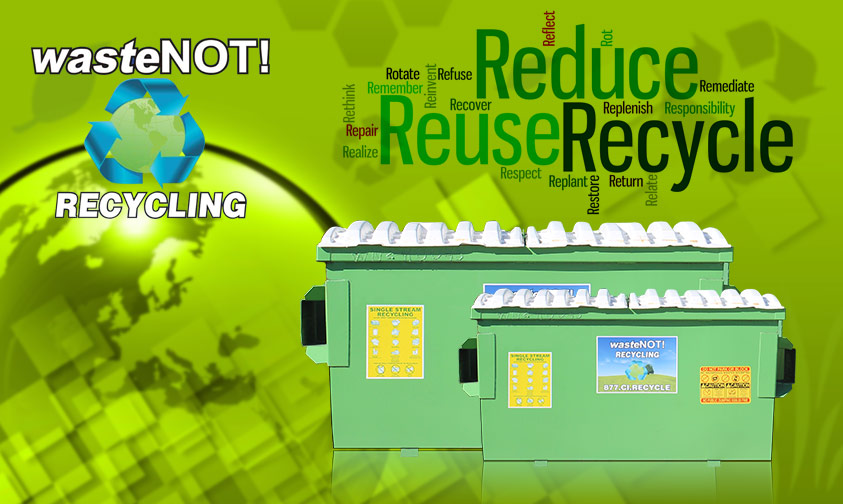The world of recycling can be a difficult place for many. For some, they recycle daily and know the ins and outs of what needs be done. However, for many it’s often the question of “what can I recycle” that leaves us wondering and generally forgetting to do so.
That’s why DisposAll has compiled the ultimate list for recycling that leaves no stone unturned. Go ahead and brush up on your knowledge and rightfully gain that magic green badge for the environment!
Metals:
The first item on the list is the famous empty soda cans that are discarded by millions each year. Out of the millions that are just tossed away, only about 50% is actually recycled and that has a big impact on the economy and environment. Recycling tin cans and steel can save over 70% of the energy that was used to produce them.
- Aluminum Cans
- Aluminum Foil and Bakeware
- Steel Cans and Tin Cans (These include soup cans, coffee cans, veggie cans, etc.)
Paper Products:
According to the Environmental Protection Agency, paper products make up roughly 71 million tons of the municipal waste stream and they are used by the majority of us every day.
- Corrugated Cardboard
- Magazines
- Office Paper
- Newspapers
- Paperboard
- Gable-Top Cartons (Non-Plastic Juice and Milk cartons)
- Junk Mail (Those unfavorable pieces of mail we so hate. Next time just place it nicely in the recycling)
- Phone books

WasteNOT! Recycling
Glass:
This can be a tricky customer, as leaving just the smallest amount of material mixed in, can contaminate entire loads. Make sure the contents are cleaned thoroughly and always handle with care.
- Clear Glass
- Brown Glass
- Green Glass
There are, of course, certain glass materials that shouldn’t be recycled.
- Glass that is contaminated with dirt and food waste etc
- Ceramics, such as ovenware, dishwasher, and decorative items
- Heat- resistant glass
- Mixed colors of broken glass
- Mirror or window glass
- Crystal
- Light Bulbs
Plastics:
They are found everywhere and we Americans recycle roughly 2.4 billion pounds of plastic every year. That may sound like an awful lot, but it only takes up 27% of the waste stream. There is a wide variety of plastics that can be recycled. As always, you must make sure they are clean!
- If plastics are not cleaned properly, they can contaminate an entire bale, and therefore destroy thousands of pounds of plastic.
- To specify what plastics can be recycled, use the shape of each product to determine. Bottles, jugs and jars are the best way to know what is accepted.
There are many household items that can be recycled even if we can’t necessarily put them into our recycle bins. Check out our list below for more details.
- Car Batteries – The number one most recycled product in America. These batteries are typically made up of 60% lead which means it’s nearly all recyclable. Be sure to contact your local municipality to find out the nearest location to recycle.
- Button and Household Batteries – Button batteries often contain recyclable materials such as zinc, silver or other toxins and should be recycled.
- Think about switching to rechargeable batteries if you use more than a dozen each year.
- Rechargeable batteries are found everywhere from laptops to cordless tools. They are normally lithium ion, nickel-cadmium, or nickel-metal-hydride and should be recycled to reclaim any valuable compounds and keep toxins out.
- Lighting is a great way to conserve energy and also do your part for recycling. Incandescent bulbs are a lot more efficient than a fluorescent.
- Compact fluorescent bulbs are being used more and more and rightfully so. They can save you money on your energy bill and the Environmental Protection Agency is working with Central Florida companies and retailers to expand recycling in the future.
Electronics:
Those that are destined for recycling are often called “e-waste”. When recycled properly, these are a valuable source of secondary raw material.
- Computers – Make sure to never dump a computer and its parts into a landfill. They are all valuable resources.
- Office equipment such as photocopiers, printers and fax-machines – Recycling such items can lessen pollution, reduce the energy for manufacturing new products and save resources. Be aware that printer cartridges do not belong in landfills as they can contain hazardous waste.
- Consumer electronics such as VCRs, home/office phones and stereos – This can also include calculators, audio equipment, recording devices, and digital clocks. However, each state defines consumer electronics differently, so please check beforehand.
- Cell Phones.
The following is a list of items that you shouldn’t recycle as e-waste.
- Thermometers
- Large appliances such as refrigerators, etc.
- Fire alarms and detectors
- Microwaves
- Any product with liquids or sludge
Hopefully, you find this list useful and above all else it will teach you how to recycle important items and save our environment. Make sure you check out our spring cleaning article Spring Cleaning: The Do’s and Don’ts! for other tips and tricks.


